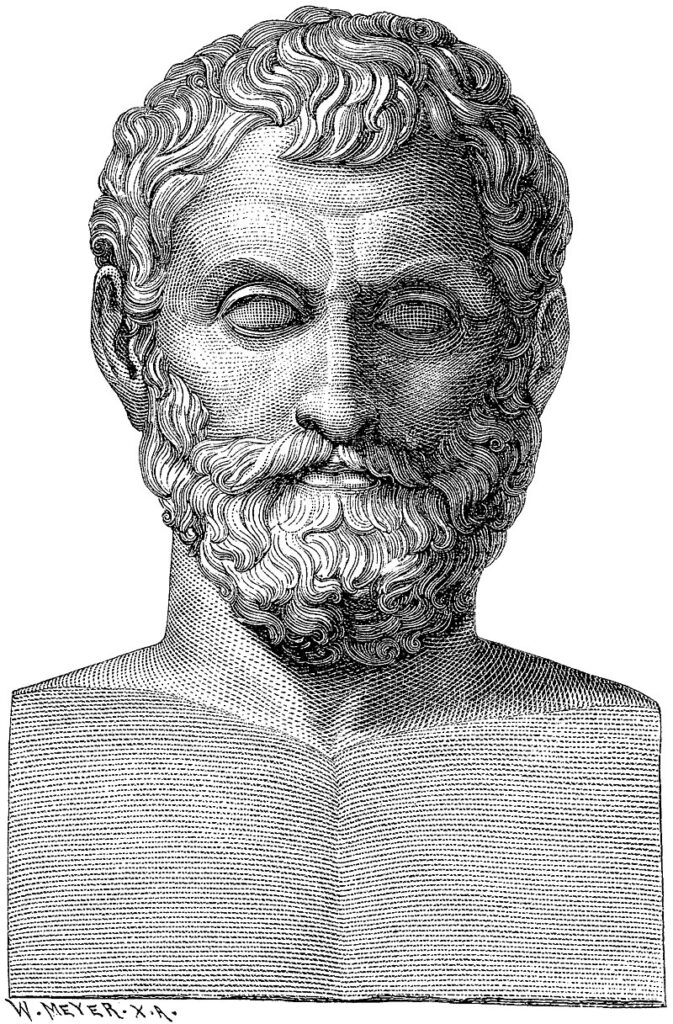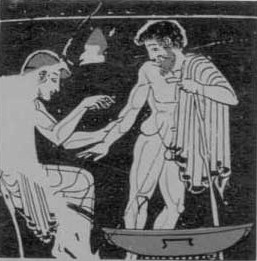Note (added 31 August 2022): Two philosophically minded Greek physicians, Aretaeus of Cappadocia, who lived around the second century AD, and Hippocrates of Kos, aka the Father of Medicine, who lived in the fourth and fifth centuries BCE, would have made stronger examples of severe misogyny in ancient thinkers— read here to see why — but the philosophers I discuss below, Thales and Hippo of Samos, are revealing too.

Today the United States Supreme Court overturned Roe v. Wade, giving states the green light to criminalize abortion. Half the fifty states are now expected to do so. This is an authoritarian assertion of control over women’s bodies; it is forced childbirth for those pregnant.
Some 2600 years ago, the progenitors of Western philosophy walked around ancient Greece conversing with each other, their followers, and the military leaders who grew up with them as tutors. (Anaxagoras taught Pericles; Aristotle taught Alexander the Great.)
The received view sees these men, and their conversations, as the starting point of Western philosophy. The ivory tower, the think tanks, the intelligentsia all starts with them.
Even Supreme Court decisions, the justices’ clerks pouring through tomes in the library, are built on this intellectual edifice that rests on ancient Greek philosophers.
The ancient thinkers kicked off Western philosophy with masculinist bias. For those not familiar with the word masculinism, consider it the opposite of feminism. In The Creation of Me, Them and Us, contemporary philosopher Heather Marsh defines masculinist theory as “based on research that only includes men or is presented from an exclusively male point of view or which sets the experience of men as the normative standard.”
Read W.T. Jones’ five-volume A History of Western Philosophy, covering thousands of years, and you will see not a single woman is included in all those pages. That’s masculinist theory for you. The tomes discuss battle and blood and sweat, but nearly nothing about caregiving and reproduction.
When the foundations of the intelligentsia were being built in ancient Greece, how did masculinist theory arise? After all, women have been heard more and more lately through #TimesUp, #MeToo, and #OpDeathEaters; today’s ruling is a slap in the face, trying to turn the volume down on women and the topics often associated with them.
Thales: All is what?

W.T. Jones and others present Thales as the father of Western philosophy. In the sixth century BCE, he lived on the Mediterranean shores of what is now Turkey.
If you look at standard resources such as the Internet Encyclopedia of Philosophy’s entry on him (provided by the University of Tennessee at Martin), you will learn the most important idea of Thales was that all is water.
His metaphysical theory — all is water — is classified as material monism. Material meaning he didn’t say all is something nebulous such as energy, but all is something definitively material, water. As for monism, that means all is just one thing. Unlike, say, Empedocles, another philosopher of the era, who reduced existence to four different things he called “roots,” Thales credited water alone with being the universe’s fundamental stuff.
In her highly readable book Thales of Miletus, philosophy professor Patricia F. O’Grady explains what all is water actually means. Thales envisaged water as a cyclical, pervasive medium. Cyclical like the water cycle: puddles evaporate into clouds which rain; the rain solidifies into mud and maybe rock that eventually liquefies. Pervasive as in water existing everywhere as a kind of backdrop from which familiar objects (trees, sand, etc.) emerge and back into which they dissipate as they move and change. Thales is awarded historical importance for his theory partly because it is held to represent the beginnings of looking at the world scientifically: attributing happenings to the natural substance of water rather than supernatural divinities.
That may be the complete story of Thales’ idea.
However, it is a speculative reading, but Thales may have meant his water to have semen-like qualities. This is not something explicit I have come across in readings on Thales, but a passage by the famous ancient philosopher Aristotle suggests it to me. (Thales left no primary source writings, so we depend on other philosophers, particularly Aristotle, to learn his views.)
Conjecturing how Thales arrived at his watery theory, Aristotle suggests Thales may have observed that “the semina of all things have a moist nature, whereas water is the first principle of the nature of moist things” (983 b27).
The “semina of all things have a moist nature” is a pretty evocative phrase: it says all things include semina, or seeds — seeds in a broader sense than just sperm — and that these seeds are moist. He then says water is the first (fundamental) thing, when it comes to moist items, which apparently include everything since all things have moist semina.
It also seems to me Aristotle, or Aristotle’s Thales, is trying to associate the two — the water and the moist semina.
Not so much a “I proved he certainly meant this” and instead a psychological reading, as in: Gee, what do you think these guys are really talking about here with all this stuff about moist generative seeds?
He may have just meant botanical seeds, or Aristotle may be suggesting that an observant Thales saw, ubiquitous, moistness and seeds — even sperm, which is watery. Maybe the metaphysical water of Thales was intended to be understood as sperm or more plausibly sperm-like, with motive and generative powers, as Thales imbued it.
I could be flat-out wrong. Thales’s word for water, ὕδωρ, does not mean semen anywhere in ancient Greek. But I think the Aristotle passage is pliable enough for us to consider that Thales might have connoted, not “all is semen,” but “all is water, which is a lot like semen.”
Aristotle’s hypothetical Thales going on about semina, and seeds (of some sort) somehow being relevant to his foundational water, suggests the founder of Western philosophy may have been arbitrarily prioritizing men, a way of making men’s seminal fluid close to the foundational stuff of reality. After all, why could it not have been vaginal arousal fluid or amniotic fluid? If Thales was giving his foundational water qualities of semen, that would mean other, non-semen things fall in approval by comparison. A woman risking childbirth, a dangerous feat, would not be of foundational importance, if what’s close to the most important thing (water) is semen rather than her fluids. And if so, that is the historical origins of today’s Western intelligentsia: masculinist bias.
(I should note there are probably other ancient thinkers with views about sperm that I am simply unaware of. I just happen to have recently studied Thales and Hippo of Samos.)
Hippo of Samos: Listen up, men produce the soul

Roughly a century after Thales, in the fifth century BCE, the philosopher and physician Hippo of Samos said something similarly prioritizing semen in his explanation of the universe. He is conventionally described as coming from the island of Samos, but in fact he may have come from any number of places in the ancient world.
The theologian Hippolytus from a few centuries later records in his book Refutation of All Heresies the otherwise unavailable words of Hippo of Samos: “semen […] manifests itself to us […] from moisture […] it is from this [i.e. the seed] that, [Hippo] says, the soul is produced.”
In other words, Hippo believed the soul derives from semen. Moist semen, if you want the details. The soul is not the entire universe, but of course the soul is rather important.
If we agree it is semen, and nothing else, from which the soul is derived, then we might look down on other substances. What about vaginal arousal fluid or amniotic fluid? These are not soul-producers, according to Hippo of Samos, but we nevertheless know their importance in reproduction. They are left out of soul-production by Hippo of Samos because of masculinist bias: he’s established an exclusively male point of view, setting the experience of only men as the normative standard. He’s arbitrarily left out vaginal arousal fluid and amniotic fluid (and other things) to focus exclusively on semen.
Again, these ancient thinkers are those held by the ivory tower to be their system’s origins. It’s a commonplace that an undergraduate philosophy degree is good preparation for law school, with philosophy majors besting other majors in LSAT scores. Learning that everything is semen or that nothing but semen has a role in producing the soul sends a clear message as to whose voices are to be heard: men’s. Moving from that in the classroom to law school to clerking for the Supreme Court … well, you get the idea.
There are probably other ancients besides Thales and Hippo of Samos who have outlined masculinist systems. In The Creation of Me, Them and Us, Marsh writes the opinion that women are “subjugated by nature” is “an opinion philosophers and scientists have pontificated about for centuries with long treatises on passive eggs and active sperm.” It seems injustices need justification; we give way too much honor to philosophers justifying the unjustifiable.
The eye of biology
A single man can inseminate many, many women. But if you want humanity to survive, you wouldn’t want your species to consist of a single woman. She might die in childbirth (which is more dangerous an activity than often realized) and at the very least she will have to dedicate massive amounts of time and energy to pregnancy and presumably caring for a completely dependent infant across years. So, multiple women are needed, whereas just one man can get the evolutionary ejaculatory job done. Therefore we have a glut of inseminators: too many men. But humanity has to make sure to have enough women. Ergo, women are of higher survival value to the species than men. This argument appears to me rigorously true.
From unheard to heard
When men do not hear women, they pay a price.
I have spent many hours in coffeeshops sitting with some male friend discussing Western philosophers. What about the ancient philosopher Anaximenes, a material monist who said all is air? Stroking our chins, wondering whether we’re made entirely of water or entirely of air, seems a silly question isolated people on thrones would talk to each other about if they are exempted from salt-of-the-Earth efforts such as domestic cleaning, childbirth, taking care of houseplants, etc.

Of course, intelligentsia paints a lot of prestige onto philosophers — think of elaborate printed editions for the complete works of WhicheverAncientopholes — and I haven’t had too much success convincing my guy friends it’s all a bunch of hype. There’s a kind of machismo of the intellect, I’ve read more Empedocles than you, which to many men is worth more than successfully repotting a houseplant for the first time (as I did today!) or planning a hike with a friend and her dog.
The masculinist intelligentsia has spent millenia downplaying basic activities of life, activities frequently associated with women. Look at billionaire celebrity Elon Musk, promising Mars without ever once discussing who will provide the caregiving on his spaceships. He is speaking of a masculinist space fantasy, like those old Arthur C. Clarke science fiction novels with familyless protagonists who fly around the universe and save it singlehandedly without ever needing to do laundry or cook a meal. Maybe those who say laundry and cooking are irrelevant are often those who have someone else to do it for them.
Too many of my male acquaintances who look up to the right-wing machismos, the Jordan Petersons, the berating ex-military youtube coaches, are the very same guys I know who are simultaneously in financial desperation, abusing opioids, and at risk of (or already committed) suicide.
It may seem dramatic, but it really is a battle between life and death. In her essay “The Carrier Bag Theory of Fiction,” science fiction writer Ursula K. Le Guin explores her lack of interest in the warfare superiority stories told by the conventional sources, and her preference for stories about, say, gathering food with children:
(“What Freud mistook for her lack of civilization is woman’s lack of loyalty to civilization,” Lillian Smith observed.) The society, the civilization they were talking about, these theoreticians, was evidently theirs; they owned it, they liked it; they were human, fully human, bashing, sticking, thrusting, killing. Wanting to be human too, I sought for evidence that I was; but if that’s what it took, to make a weapon and kill with it, then evidently I was either extremely defective as a human being, or not human at all.
That’s right, they said. What you are is a woman. Possibly not human at all, certainly defective. Now be quiet while we go on telling the Story of the Ascent of Man the Hero.
Go on, say I, wandering off towards the wild oats, with Oo Oo in the sling and little Oom carrying the basket. You just go on telling how the mammoth fell on Boob and how Cain fell on Abel and how the bomb fell on Nagasaki and how the burning jelly fell on the villagers and how the missiles will fall on the Evil Empire, and all the other steps in the Ascent of Man.
Men can also feel disgust at bombings and delight at gathering food. We men need to stop telling ourselves the stories of masculinism and ask women what they know. Maybe someday men can provide traditional male virtues too, such as strength, in ways that are not harmful but helpful.
Resistance
Even amid the masculinist forces of hierarchy and war, to flourish in life requires growing, increasing one’s autonomy; the Supreme Court pushed women down today, taking autonomy away, but things don’t have to end here. The stakes are higher than many just seeing the headlines might know. For example, the National Right to Life Committee is calling for criminalizing aiding people in finding abortions. (Planned Parenthood and others currently continue to assist pregnant individuals in just that manner.)
In Mexico, the abortion rights movement took several years to build the capacity for marches, occupations, and even strikes, and it paid off: in September 2021, the Mexican Supreme Court decriminalized abortion across the country. Those in the United States may be unfamiliar with having a prosocial, genuine nation around oneself, and may be unfamiliar with the kind of work put in by such a people to win political gains. From Sofia Tafich’s excellent article “Abortion Rights Movement Grows in Mexico“:
on March 9, 22 million women participated in a milestone national strike, #UnDíaSinNosotras (A Day Without Us), to visualize a Mexico without women. No women in the streets, no women at work, no women in school, no women shopping, no women on social media. The business group Concanaco Servytur estimated that if every woman took part, their absence could cost the economy up to 1.37 billion dollars. Women who couldn’t participate for personal reasons were invited to wear purple as a sign of solidarity.
Instead of accepting defeat, individuals in the United States can join forces and escalate their efforts, perhaps starting with some of these tactics. Responding to the Supreme Court, Putingate whistleblower Reality Winner tweeted today:
Dethrone and turn the volume down on wrongly hallowed masculinist philosophers and academics — don’t be fooled by their weighty editions in fancy fonts — and turn the volume up on people putting in the work for great justice.


This blog post, Opposition to Roe v. Wade since the sixth century BCE, by Douglas Lucas, is licensed under a Creative Commons Attribution-NonCommercial-ShareAlike 4.0 International License (summary). The license is based on the work at this URL: https://douglaslucas.com/blog/2022/06/24/opposition-to-roe-v-wade-since-the-sixth-century-bce/. You can find the full license (the legalese) here. To learn more about Creative Commons, I suggest this article and the Creative Commons Frequently Asked Questions. Seeking permissions beyond the scope of this license, or want to correspond with me about this post one on one? Email me: dal@riseup.net. And gimme all your money!
 Twitter:
Twitter:
Join the conversation